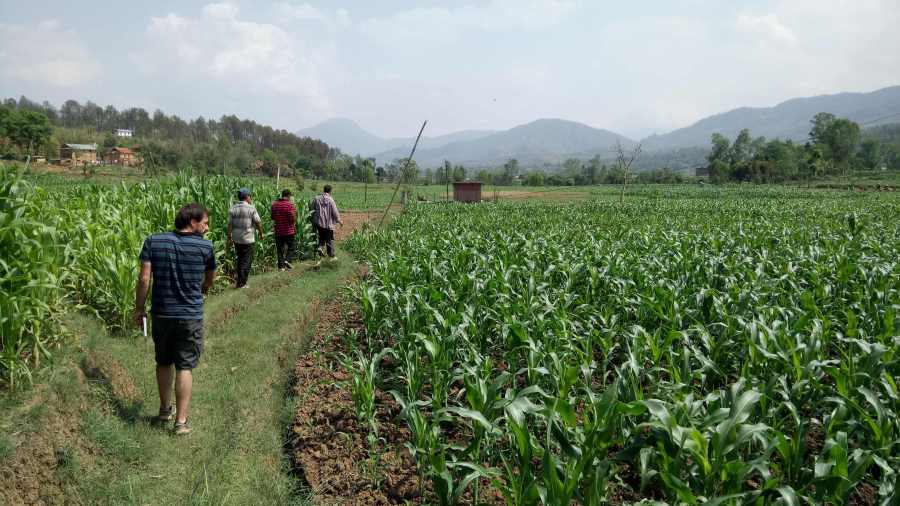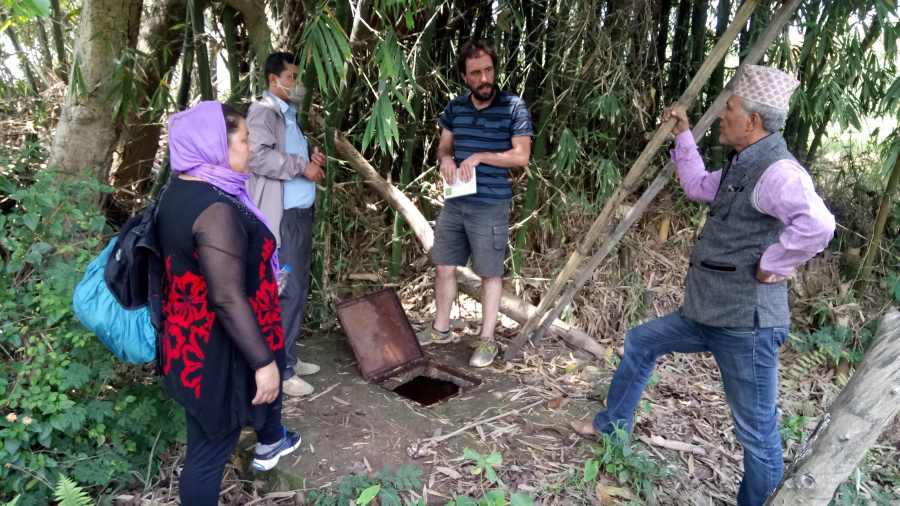Providing technical assistance to our solar projects
On January 12th of this year, many airlines flying out of London took the decision to ground their planes. The met office had been warning of blizzards for days and on that Thursday evening a light snowstorm had caused major delays and disruptions to travel.
Why do I remember this? Because that was the evening I was booked to fly out to Nepal along with my colleague David Fernandez who was on his way back to Bangladesh.
David has become Renewable World’s resident globetrotter, and because of his background in engineering, has spent brief periods of time in a number of the countries where we have active projects, including Bangladesh, Nepal, and Kenya. Whilst there he serves as a Technical and Project Manager, providing technical assistance to our solar projects.
Until recently, the last time I saw him was on a cold, wet night at the check-in counter at Heathrow, but now we sit in glorious sunshine on plastic lawn chairs at the Renewable World office in Kathmandu.

Surprisingly, David’s education was as a mining engineer, but rather than commit to fossil fuels – the obvious choice, he chose a different path. “It is funny”, he says, “because mining is always related to, with coal and oil, [but] in my school, they have like three branches, three specialities, and one of them is renewable energy.” As a result of this, David chose to specialise in renewable energy, a discipline that was relatively new at that time, and after graduating “started working at a global energy company.”
After half a decade in Spain, he moved to Portugal for a year to work in a research capacity, before then heading to the UK and working for a multinational European company in their sustainable energy department, a “small, small, small branch”, he tells me with a wry smile whilst raising his hand and placing his thumb and index finger slightly apart.
As with most countries, the UK couldn’t satisfy David for long and for a variety of reasons, he began to seek pastures new. Briefly he spoke of a long-term relationship that was “broken”, which he needed time away from, but the major push-factor appears to be an intense dissatisfaction with the work that he was doing: “I been always having this idea of changing my career path”, he tells me, “I was working in England for multinational companies, big projects, massive projects where they were more worried about tick the green box of the energy and so they can put on their website, ‘we are green’, rather than having a project which is useful.”
This distaste for the greenwashing tactics of major corporations is a frequent criticism from David, as is his perception that such corporations are only interested in profit. Speaking of his previous employer, he says: “they were more focused on money and only having this green energy [label on their website]. So, I was a bit disappointed.”
This disappointment led David to speak with his boss, and enquire about the one-year career break option that they had, but when they turned him down he quit regardless, “I didn’t mind”, he says, “it was an easy decision. I don’t regret at all.”
The private sector’s loss was the international development sector’s gain as David shifted his focus from profit to people and began volunteering with Renewable World in January 2016. What clinched the deal in our favour was the opportunity to see the impacts that occurred because of energy access. It was an experience David did not get when he worked in the UK in the private sector.
David tells me that he always knew his career path was going to be related to energy, whether that was working for a charity or working for the private sector, he seems to see energy access as a social campaign, a crusade to provide everyone with what they deserve: “I really believe that energy is something that is a basic need. It’s like water, it’s a basic need for everybody, and there are things that are not right.”
More than once our conversation trails off into politics; the 2008 global financial crisis, the state that Europe and his native Spain have found themselves in since then, the unsustainable ways in which we live – “things need to change,” he tells me, “minds need to be changed, we cannot consume our country… our planet like we are doing now.” It is clear that David has been deeply affected by his experiences and has a strong desire to walk a different path, abandoning the company car in the UK, he now appears to be very much committed to living and working in developing countries. And though he feels he can be “anywhere” a decade from now, he has hopes of reaching South America where his Spanish can be put to good use.
Until then Renewable World are benefiting from his passion, and his flexibility by using his expertise to support our projects in East Africa and South Asia.

In early 2016, whilst living and working in Nepal, assisting with our solar-powered water pumping project, David also supported project managing our first project in Bangladesh. This project, Powering Aquaculture, is working to bring solar micro grids to fish hatchers and surrounding communities, is supported through USAID’s Powering Agriculture initiative.
After five-months in Nepal, with his visa due to expire, and with security issues heightened in Bangladesh, David relocated to Kenya. Here he supported our solar microgrid (Energy Hub programme) for six weeks, before finally making it back to his original destination – Bangladesh.
Powering Aquaculture is set to be completed at the end of May and will provide clean energy to two fish hatcheries and as many as 100 households. Solar microgrids have been installed with 30% of the energy going to the fish hatcheries and the remaining energy being provided to the local households for lighting. The households will use the energy for lighting and to power fans – it can often climb above 40 degrees Celsius during the summer months, and the fish hatcheries will use it to pump water.
David explains to me that the fish hatcheries have ponds where they grow their eggs into fingerlings. If these fingerlings aren’t sold to other nurseries or local households that have ponds themselves, they are kept until they grow to be full-size, and then they are either eaten or sold at market. The power from the solar microgrid powers a pump which provides the constant flow of water which is needed through the fish hatcheries ponds.
Over the next 12-months, the impacts will be monitored and evaluated, and the hope is that this pilot will attract interest from the private sector. David says that “we are proving that the system we are doing now in Bangladesh is good enough for a private owned system”. If the monitoring and evaluation shows meaningful impacts, “the idea will be much easier to scale up.”
The fish hatcheries receive enough energy to pump water through their ponds, and the households receive clean lighting and energy to power fans. By collaborating, both these parties can benefit, and the technology provider – the company installing the solar microgrid – is also capable of making a profit.
David says that in one year, he would hope to see more examples of this project without Renewable World’s involvement: “this is a solution we have created, with two partners working together, and each of them has their own benefits and they can work together. And if we are able to demonstrate this in one year, then next year is not only going to be fish hatcheries, it could be a dairy, milk processing with another technological provider, so this could be scale up, this would be great to see this happening.”
What advice would you give to someone looking to work for an NGO or INGO?
Just try… You are not going to ever regret to do this, so just try. Just for some time, as a volunteer for one year. Just try it.
Last book?
“I read recently this book from George Orwell, Homage to Catalonia.”
Last holiday?
“Last year I went to Indonesia”
Last item bought?
“Bangladeshi clothes as a present for my sister”
Interview and article produced by Paddy Vipond